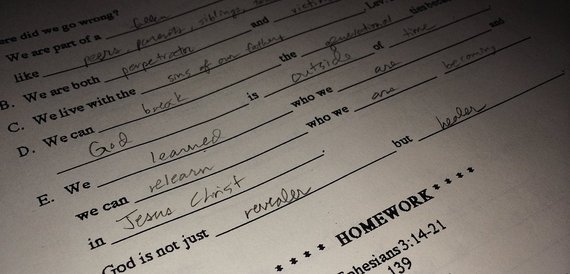The '90s were a difficult time for us Gen-X gays. Too young to have experienced the AIDS crisis and too old to have grown up in the era of Ellen and equality, we were caught in a sort of homosexual no-man's land. Resources for LGBT youth were scarce, and many of us struggled to find peers. We each knew only a great gay wilderness. Illusions of inclusion were all around us yet were completely unknowable, lest our darkest secret be discovered and our fears of rejection realized. In 1994, when I was 20, that sense of loneliness almost crushed me.
The first person I ever came out to was my straight best friend. He was a fundamentalist Christian and suggested that I turn my life over to Christ so that I could embrace His "healing power." It was the first glimmer of hope I'd ever seen, so I jumped headlong into a local ex-gay ministry. Though the prospect of salvation seemed to brim with promise at the time, I was completely unaware of how much psychological damage the "treatment" would inflict upon me. I was blinded by insecurity, inexperience, and the fact that I'd finally met others who genuinely seemed to understand my feelings of isolation.
The sessions were held in a group format. Eight of us met weekly for lectures, discussion, and prayer. The leader of the group had a master's degree in theological studies, lending a sense of academic legitimacy. I recently came across my workbook from the lectures, which presented plausible-sounding psychological theories about the origins of homosexuality, like, "Gender confusion can come about when children reject their same-sex parents as role models." The exercise portion of the workbook combined these theories with passages from scripture, consisting of fill-in-the-blank statements like:
- We are part of a fallen world; we are both perpetrator and victim.
The exercises seemed designed to lead the student to an inescapable conclusion: You're a lonely, self-loathing fag. We know it's horrible. But God wants you to be happy, and the only way to do that is to stop being gay. The curriculum called out our deepest fears, amplified them, and then offered us a tantalizing way out. So help us God.
At no point did I feel that anyone in the religious ex-gay world didn't want the best for me. In their own way, these people genuinely cared. And when the world accused them of disseminating anti-gay teachings, they would unwaveringly respond with a phrase that would become familiar to me: "Love the sinner, hate the sin." In time, however, I learned that the ex-gay movement wasn't based on love at all, nor was it based on hatred. It was based on fear.
Many people, both gay and straight, participate in some form of same-sex experimentation at some point in their lives. This is actually quite common in children: About 30 percent of boys and 8 percent of girls report engaging in homosexual play by the age of 11. Experimentation is a normal part of sexual development, and curiosity about the same sex often continues into adolescence and adulthood. But to those who are pressured (often brutally) to conform to a heteronormative social system, the mere thought of attraction to another woman or another man -- and the accompanying threat of discovery -- can be downright terrifying. And in some people that fear turns to hatred: hatred of the different, of the unknown, or of the insidious so-called "gay agenda." In reality, though, their hatred is nothing more than a defense against their own fear.
California and New Jersey are the only two states to explicitly ban certain forms of conversion therapy, which often incorporates religious teachings (sometimes referred to by critics as "pray the gay away"). On signing New Jersey bill A. 3371 -- which states that professional counselors "shall not engage in sexual orientation change efforts with a person under 18 years of age" -- into law last year, Gov. Chris Christie referenced the American Psychological Association's 1997 resolution condemning conversion therapy, noting that the practice has been shown to cause depression, substance abuse, social withdrawal, decreased self-esteem, and suicidal thoughts. "I believe that exposing children to these health risks without clear evidence of benefits that outweigh these serious risks is not appropriate," the governor added.
Although I wasn't a minor when I underwent conversion therapy (which eventually failed), I can personally vouch for Gov. Christie's assessment: My so-called "treatment" caused significant damage to my self-esteem and ultimately increased my sense of confusion, isolation, and loneliness. It took me several years to repair the harm that had been done. After a dark period of internal conflict and explosive anger, torn between what I knew I was and what I wished I wasn't, I relocated to Boston, found a sex-positive therapist, surrounded myself with a supportive gay-friendly community, and started to feel comfortable in my own skin at last. And while I support and applaud the passage of A. 3371 and California's S.B. 1172 as excellent first steps, I believe that similar laws should be enacted everywhere and extended to protect adults as well.
Meanwhile, the ex-gay folks are dealing with their fear the only way they know how. I just wish they could understand that the best way to cope with that fear is not to project it upon others. If they can learn to see homosexuality as natural and nonthreatening and allow themselves the tolerance that their Savior was known for, then perhaps they'll realize that their ministrations, however well-intentioned, are hindering their overall mission. As the disciple Mark teaches us, we must all learn to love our neighbors as we love ourselves.

